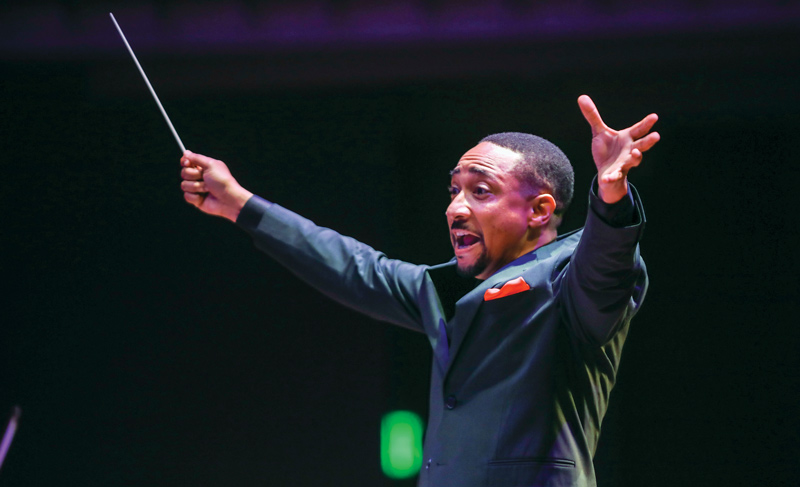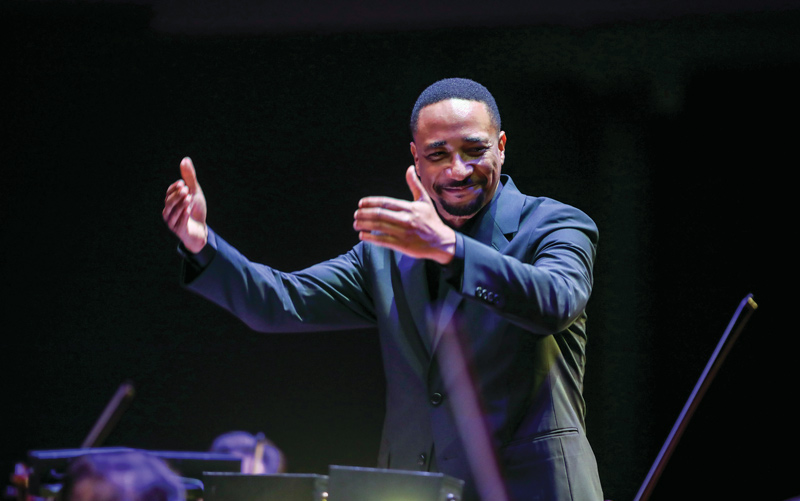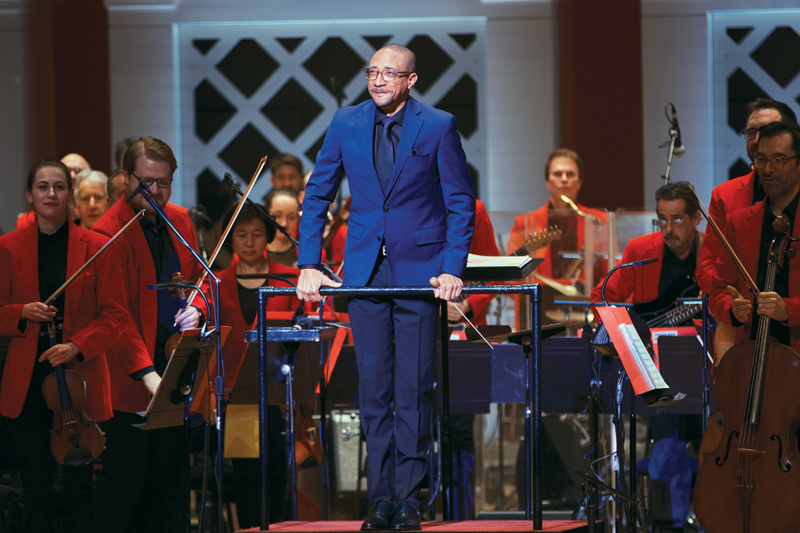Damon Gupton is on Your Screens and on Your Stages

Pops Principal Guest Conductor Damon Gupton conducts the Cincinnati Pops. (Credit: Mark Lyons)
by Hannah Edgar
Don’t look at Damon Gupton’s calendar. Seriously, don’t.
Why? You might know Gupton as a prolific actor, spotted on Criminal Minds, Deadline, Black Lightning, The Big Door Prize, Happy Face and The Last Days of Ptolemy Gray, as well as in movies like The Last Airbender, La La Land and the forthcoming Lear Rex (Al Pacino playing Lear) and The Drama (playing Zendaya’s dad). But he’s just as accomplished as a conductor, with bona fides too long to list — from his early days at the Aspen Music Festival and National Conducting Institute, to assistantships and fellowships at the Kansas City and Houston symphonies, to now, guest-conducting most of the country’s leading orchestras.
“I don’t know anybody else who’s doing this,” Gupton told Fanfare Magazine with a disbelieving chuckle, calling from his home in Los Angeles. “But for whatever reason, I think I’ve been placed here to find different avenues for myself.”
So, yes, Gupton is booked and busy. Orchestras he works with tend to be understanding of that, he says. And the Cincinnati Pops — where he makes anywhere between two and four annual appearances — is more than understanding, having named him its Principal Guest Conductor in 2019. He first conducted the Orchestra in a 2014 concert with the Midtown Men, an experience he still singles out as one of his favorite concerts to date.
“The Cincinnati Pops is a jewel of the community,” he says. “I’ve always been impressed by people’s energy and fervor for the group. It’s their pride in something that represents their town and their roots, and Cincinnatians are very right to be proud of it.”
After more than a decade appearing with the Pops, Gupton is making a long-awaited subscription debut with the CSO on May 9 and 10. Given the occasion, Gupton says he wanted his debut CSO concert to be “a little more personal.” To that end, he anchors the program with Duke Ellington’s big-band epic Black, Brown and Beige, arranged as a three-movement orchestral suite by Maurice Peress.
“It’s such a tremendous honor to get a subscription concert with the Orchestra. But coming up with pieces that balance the Ellington and honor the wonderful gift that the Orchestra is giving me — that was tricky,” he admits.

Pops Principal Guest Conductor Damon Gupton conducts the Cincinnati Pops. (Credit: Mark Lyons)
He had a sure thing, at least, in Michelle Cann, a pianist as probing as she is passionate and the CSO’s 2019 MAC Music Innovator. She and Gupton team up for the first time with this program, but the two had already met and collaborated for a 2019 episode of From the Top*, the NPR program spotlighting up-and-coming classical music talent. In the years since, Cann has joined the faculties of the prestigious Curtis Institute of Music and Manhattan School of Music, and she just won a Grammy for Beyond the Years: Unpublished Songs of Florence Price with the soprano Karen Slack.
“That was right before a lot of things really blew up and took off for her,” Gupton says of taping the episode.
Cann will perform the Edvard Grieg Piano Concerto, which taps into a throughline sparked by the Ellington: folk traditions and dance. The concerto’s finale especially embraces these themes, Gupton says: “The third movement of the Grieg certainly shares its folk heritage and style with us after the defiance and elegance of the first movement, and the reflective and soulful nostalgia of the second movement.”
So does Dvořák’s The Noon Witch. Dvořák’s symphonic poem depicts an eponymous ghoul from Slavic folklore, famous for trapping her victims with her incessant dancing. Gupton shouts out Music Director Designate Cristian Măcelaru’s recent interpretation of Dvořák’s Symphony No. 9 as leaving him feeling inspired for his own forthcoming turn to the composer — plus, he’s always a sucker for that “lovable Dvořák flair and folk bounce.”
From there, Gupton structured the concert’s second half as something of a lead-in to Black, Brown and Beige. He starts with Stravinsky’s Scherzo à la russe, whose basses and bass drum introduce an insistent beat that makes it a strong contender for the “grooviest piece on the program. He pays his own kind of homage to Hollywood and jazz, expatriate that he was,” Gupton says.
Arthur Honegger’s Pastorale d’été follows it as the program’s “slow jam.” The Swiss composer was a member of Les Six, a group of 20th-century Francophone composers whose music tended to reflect a certain à la mode cosmopolitanism.
“Clearly, they liked their jazz. I wanted a link of sorts, and while this isn’t the most direct, I do enjoy its impressionistic and bluesy embraces,” Gupton says of Pastorale d’été. “It was always a very, very, very distant cousin to Miles Davis’ ‘All Blues’ [off the seminal 1959 record Kind of Blue] when I first heard it 20 years ago.”
Sound eclectic? That’s the point, Gupton says. He grew up admiring Erich Kunzel’s recordings with the Cincinnati Pops, but his own 11 years working with the Orchestra have left him ever more astonished by its “versatility.” He wanted to “pay tribute” to that quality in his debut.
“One week they’re playing Strauss’ Alpine Symphony, and the next they’re playing rock ‘n’ roll standards,” Gupton says. “They’re able to switch on a dime and swing like crazy.”
Born and raised in Detroit, Gupton grew up not just on Cincinnati Pops albums but movie music, his first love. When he began playing trombone in his eighth grade band, he hoped the instrument could be a way to someday access those scores.
“My introduction to the orchestra’s palette wasn’t Beethoven, Mozart, Tchaikovsky and Schubert. It was John Williams,” he says.
He’s made good on that dream. Between the end of March and the beginning of August, Gupton will lead six live film scores with orchestras from Boston — its own legendary Pops orchestra, to be exact — to Baltimore. The closest Gupton has come to merging his twin loves of film and music on screen was when he was cast in the music conservatory drama Whiplash (2014), in which he plays a more sedate colleague of J.K. Simmons’ tyrannical jazz band instructor. (At least, so far: Gupton told Fanfare Magazine he dreams of someday producing a trilogy of biopics about Florence Price, William Grant Still and pathbreaking conductor Dean Dixon.)

Pops Principal Guest Conductor Damon Gupton takes his initial bow before leading the Pops in a tribute concert to Tina Turner in January 2025. (Credit: JP Leong)
Gupton ended up passing through Juilliard’s drama school, launching him into one of his two callings. Before that, however, he earned a bachelor’s degree in music education at the University of Michigan. (“One of my favorite things to do from the podium in Cincinnati is troll Ohio State,” he teases.) He made his conducting debut as a student there in 1992, leading a concert put on by the school’s Black Arts Council. Many of the students involved went on to renowned careers — like pianist Karen Walwyn; violinist Joseph Strickland, the Detroit Symphony’s first Black musician; and Guthrie Ramsey, an eminent musicologist at the University of Pennsylvania.
“We started that as a collective of Black music students, of whom there were quite a handful,” Gupton says. “It was a very active time politically for Black students on campus.”
Gupton returned to the University of Michigan in 2015 to give the commencement speech for the School of Music, Theater and Dance, an experience he described as “one of the deepest honors of my life.”
Although balancing his dual careers can be hectic, he’s become increasingly grateful for it in recent years, particularly as he thinks about the challenges facing today’s young artists.
“When we were on strike as actors, there was music. And when we were locked and cooped up in our homes, there were projects that were shooting,” Gupton says. “Nowadays, you’d better do more than one thing.”
Indeed, at the time he connected with Fanfare Magazine, Gupton was contemplative about the state of the world. He was spared by the fires that devastated much of Los Angeles. Some of his favorite haunts, however, have vanished. Meanwhile, portents of increasing government involvement in the arts have pushed him to be more thoughtful than ever before about his own artistic presence and body of work.
How to do that, exactly? As he always has, Gupton finds answers in movies. In the past few months, he’s been drawn to gritty dramas from the 1970s, like The Godfather, Apocalypse Now, The Deer Hunter, A Woman Under the Influence, Shaft and Jaws (a live film concert he’s also conducting later this season, with the Kansas City Symphony).
“I think that’s the greatest decade of cinema for its breadth of commentary: war, people not being able to be a part of their communities when they come home from war, alcoholism, divorce,” he says. “On my end, I’m asking myself: How can I keep the ball rolling? Is it with Duke Ellington? Is it with Grieg? Yes, OK, but what else?… It’s our call to say something bigger than us if we want to continue.”